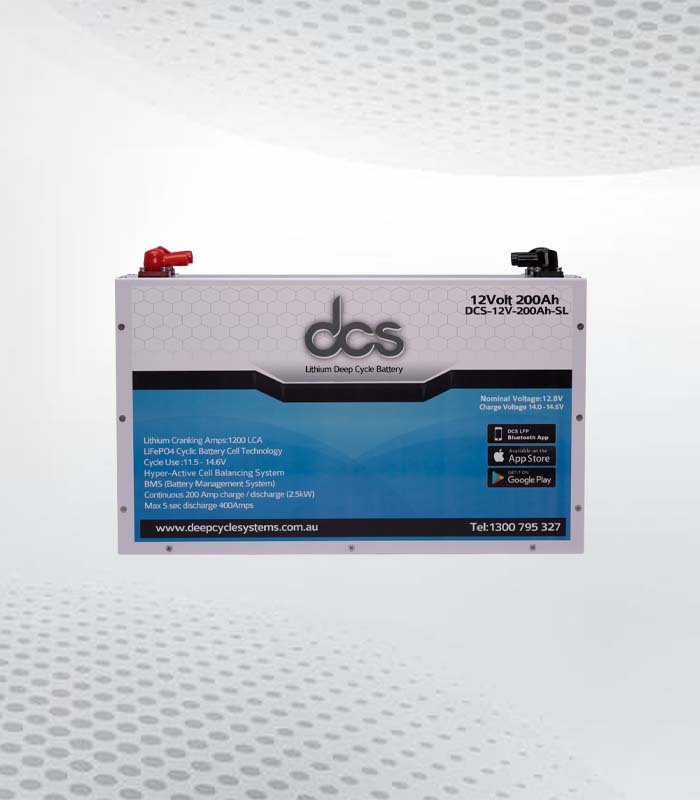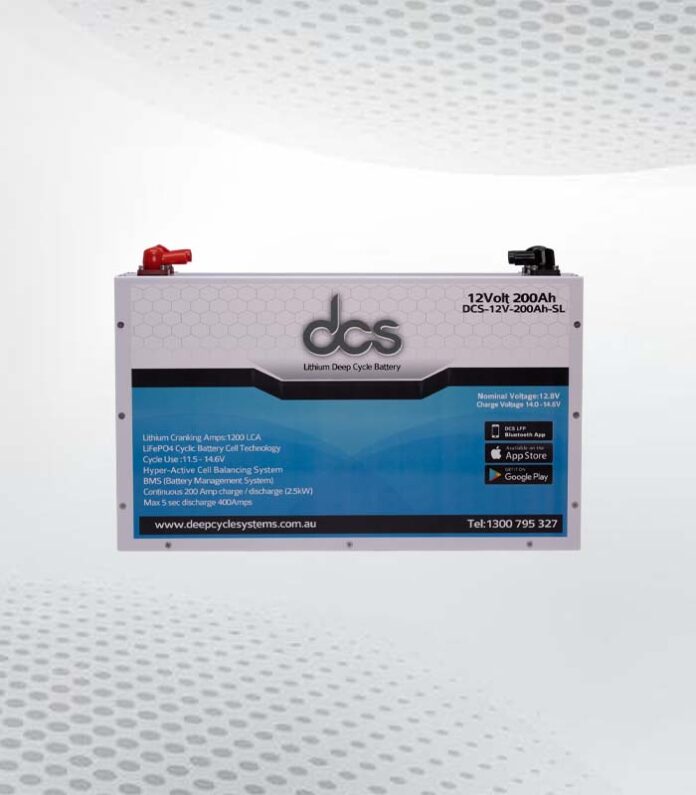In recent years, the LiFePO4 (lithium iron phosphate) battery has garnered attention for its superior performance, longevity, and safety features compared to traditional lead-acid batteries. Among these, the Lifepo4 Battery 12v 200ah stands out for its remarkable capacity and reliability, making it a preferred choice for various applications.
Understanding the Basics of LiFePO4 Batteries
LiFePO4 batteries, a subset of the lithium-ion family, distinguish themselves through their unique chemical composition. They employ lithium iron phosphate in the cathode and a graphitic carbon electrode with a metallic layer as the anode. This specific structure enhances their safety profile by minimising the risk of overheating, a common concern with other lithium-ion variants.
Furthermore, the robustness of LiFePO4 technology enables these batteries to withstand a greater number of charge and discharge cycles, significantly surpassing the endurance of traditional batteries. Their construction is not only geared towards safety and longevity but also contributes to their superior performance. The stable chemical makeup ensures that LiFePO4 batteries deliver consistent power output over time, without the performance degradation experienced by their counterparts. This makes them an optimal choice for applications requiring reliable and sustained energy delivery.
 Comparing Lifepo4 200ah with Other Battery Technologies
Comparing Lifepo4 200ah with Other Battery Technologies
When assessing the LiFePO4 200ah against alternative battery technologies, it’s crucial to consider its distinctive attributes and how they translate into real-world applications. Lead-acid batteries, for instance, although more affordable upfront, fall short in terms of efficiency, cycle life, and maintenance requirements. The LiFePO4’s ability to provide a consistent voltage level and sustain a higher number of charge cycles without significant degradation sets it apart, offering substantial long-term cost savings.
Nickel-cadmium (NiCd) batteries, known for their robustness in adverse conditions, cannot match the environmental friendliness and energy density of LiFePO4 batteries. Meanwhile, Nickel-metal hydride (NiMH) batteries, while possessing a decent energy density, suffer from a higher self-discharge rate and less impressive cycle life compared to LiFePO4 batteries.
The comparison underscores LiFePO4’s balanced profile, excelling in safety, durability, and environmental sustainability, making it a superior choice for diverse energy storage needs without the drawbacks of higher cost or lower energy density observed in some lithium-ion counterparts.
The Key Advantages of a 12V 200Ah LiFePO4 Battery
Opting for a 12V 200Ah LiFePO4 battery presents multiple distinct benefits. With a superior energy density, it outperforms similar-sized lead-acid counterparts by holding a greater charge, thus ensuring a consistent and robust power supply for more demanding energy requirements. Remarkably, its durability is evidenced by an impressive capacity for 2000-5000 charge cycles, significantly outlasting traditional batteries which typically manage only 300-500 cycles. This attribute alone extends its usability, reducing the frequency of replacements. Moreover, one of the standout features is its ability to maintain a steady voltage output throughout its discharge cycle, in contrast to the declining performance observed with lead-acid batteries.
This ensures devices and applications run efficiently until the battery requires recharging. Additionally, its resilience is notable, with effective operation across a broad spectrum of temperatures and environmental conditions, thereby offering reliability in diverse usage scenarios. This collection of advantages underscores why the 12V 200Ah LiFePO4 battery is increasingly becoming the preferred choice for those prioritising efficiency, longevity, and performance in their power solutions.
Practical Applications of the 12V 200Ah LiFePO4 Battery
The versatility of the 12V 200Ah LiFePO4 battery makes it a prime candidate for a plethora of uses across different sectors. In the realm of renewable energy systems, it is instrumental for the efficient storage of solar and wind energy, facilitating a smoother transition towards green energy solutions. Leisure sectors also benefit greatly, with these batteries providing reliable and sustained power in recreational vehicles and marine crafts, thus enhancing the experience of off-grid living and exploration. For commercial and residential settings, the deployment of these batteries in backup power systems guarantees continuity of operations and daily life during unexpected power outages. This broad applicability not only illustrates the battery’s adaptability but also its capacity to meet diverse energy demands with efficacy.
Maintenance Tips for Maximising Lifespan and Performance
Ensuring the longevity and efficiency of your LiFePO4 200Ah battery requires adherence to several straightforward yet crucial maintenance practices. It is vital to utilise a charger specifically designed for LiFePO4 batteries to prevent damage during charging. Over-discharging should be avoided at all costs, as it can significantly reduce the battery’s lifespan and operational capacity.
Keeping an eye on the battery’s state of charge can help in this regard, enabling timely recharging and thereby maintaining optimal battery health. When the battery is not in active use, storing it in a location that is both cool and dry will help in preserving its structural integrity and performance capabilities. Unlike other battery technologies, LiFePO4 batteries do not necessitate equalisation charges, which streamlines their care routine. By following these guidelines, you can ensure that your battery operates at peak efficiency for the longest possible time, making the most of your investment in LiFePO4 technology.
The Environmental Impact of LiFePO4 Batteries
LiFePO4 batteries stand as a greener alternative in the battery market, offering advantages that extend beyond their operational benefits. Unlike their lead-acid counterparts, they eschew the use of dangerous substances such as lead and acid, which pose significant environmental and health risks upon disposal. The inherent longevity of LiFePO4 batteries further enhances their environmental credentials. As they are capable of enduring thousands of charge cycles, the frequency at which they need to be replaced and consequently disposed of is markedly reduced.
This longevity not only diminishes the demand for raw materials but also lowers the volume of waste generated over time. Additionally, the efficiency with which these batteries operate contributes to a reduction in the energy required for charging, thereby indirectly reducing the carbon footprint associated with their use. It’s this combination of reduced hazardous waste, longevity, and operational efficiency that underscores the role of LiFePO4 batteries in fostering a more sustainable approach to energy storage and usage.
Future Trends in LiFePO4 Battery Technology
The trajectory of LiFePO4 battery technology is marked by dynamic advancements aimed at pushing the boundaries of what these power sources can achieve. In the pursuit of enhancing their appeal and functionality, scientists and engineers are channelling efforts into augmenting energy density and streamlining manufacturing processes. Such endeavours are expected to not only elevate the performance metrics of these batteries but also render them more cost-effective for a broader audience.
With the propulsion towards electric vehicles and the expansion of renewable energy infrastructure, the demand for batteries that marry longevity with eco-friendliness is on the rise. Innovations in electrode material composition and the integration of novel, sustainable materials are poised to further solidify the standing of LiFePO4 batteries as a cornerstone of modern energy solutions. These forward-looking initiatives underscore a commitment to refining an already robust technology, ensuring its relevance and superiority in an increasingly environmentally conscious market.
Making the Switch to LiFePO4: What You Need to Know
Transitioning to LiFePO4 batteries necessitates careful consideration of your energy requirements and financial capacity. The initial outlay for these batteries may be higher than traditional options, yet the durability, efficiency, and operational savings they offer can significantly outweigh initial costs over time. It’s essential to verify that these batteries are compatible with your existing systems, which may involve adjustments or additional equipment to fully leverage their benefits.
Furthermore, understanding the specific charging protocols and maintenance needs of LiFePO4 technology is key to optimising their lifespan and performance. Seeking advice from a professional in the field can be invaluable, providing insights tailored to your unique circumstances and ensuring you make the most informed decision. Transitioning to this advanced battery technology represents a forward-thinking step towards more sustainable and reliable energy management.
LiFePO4 Battery Safety: Important Considerations
LiFePO4 batteries are praised for their inherent safety advantages over other lithium-ion chemistries, thanks to their stable chemical composition which significantly reduces the likelihood of overheating and thermal runaway. Nevertheless, it remains crucial to observe proper handling protocols and manufacturer’s instructions to mitigate risks effectively.
This includes ensuring that the battery is not subjected to extreme physical stress that could lead to structural compromise, as well as avoiding exposure to direct sunlight for prolonged periods, which could precipitate overheating. Charging practices demand particular attention; using a charger specifically designed for LiFePO4 technology is imperative to prevent overcharging and potential damage. Furthermore, installations should be inspected regularly for any signs of wear or damage to electrical connections that could lead to short circuits. By maintaining vigilance in these areas, users can uphold the safety integrity of their LiFePO4 200Ah batteries, ensuring a secure and efficient energy storage solution.
LiFePO4 200Ah Battery: Worth the Investment?
Deciding on the value of investing in a 12V 200Ah LiFePO4 battery hinges on an evaluation of your specific energy needs and financial considerations. This battery type stands out for its longevity, minimal maintenance requirements, and intrinsic safety features, positioning it as an attractive option across a variety of uses. Despite the initial higher purchase price compared to conventional batteries, the extensive cycle life and operational efficiency offered by LiFePO4 batteries signify considerable savings over time.
The environmental benefits, such as reduced hazardous waste and lower energy consumption during charging, further bolster its appeal to those committed to sustainable energy practices. Evaluating these factors against your unique circumstances will illuminate the practical and economic merits of transitioning to LiFePO4 technology. For individuals and organisations prioritising reliable, efficient, and eco-friendly energy storage, the investment in a LiFePO4 200Ah battery could indeed prove to be a judicious choice, aligning with both immediate and long-term energy management goals.
FAQs
**Q1: Can I use a 12V 200Ah LiFePO4 battery in my existing system that currently utilises a different battery type?
A: Generally, yes, but some adjustments may be necessary. LiFePO4 batteries have distinct charging requirements and voltage ranges compared to other battery types, such as lead-acid. Therefore, it’s essential to ensure that your system’s charging mechanism is compatible with a LiFePO4 battery to avoid potential damage or inefficiency. It may be advisable to consult with a professional who can assess your current setup and advise on any required modifications to facilitate a seamless transition to LiFePO4 technology.
**Q2: How does the cost of a LiFePO4 200Ah battery compare to its performance and lifespan benefits?
A: While the initial purchase price of a LiFePO4 200Ah battery is typically higher than that of traditional lead-acid batteries, its cost-effectiveness becomes apparent over its lifespan. Due to its capability to endure significantly more charge cycles, a LiFePO4 battery offers a lower cost per cycle, translating into considerable savings over time. Additionally, the reduced maintenance requirements and efficiency in energy usage further contribute to its overall value proposition. Therefore, when evaluating the investment, it’s crucial to consider these long-term operational savings and performance benefits, which often justify the upfront cost for many users seeking reliable, sustainable, and efficient energy solutions.
Conclusion
In drawing this review to a close, it’s evident that the 12V 200Ah LiFePO4 battery represents a significant leap forward in energy storage technology. With its unparalleled combination of longevity, safety, and environmental friendliness, it sets a new benchmark for what consumers and businesses alike can expect from their power sources..
| Other Good Articles to Read |
| Blogs-Nation |
| Blogs-Peoples |
| Bryan Smith Blogs |
| Intellect Blogs |
| The Fault In Our Blogs |
| Blogs Eu |
| Oz Forums |
| Recruitment Blogs |
| Zet Blogs |
| Id Blogs |
| Blogs Tudiolegale |
| Blogs Map |
| Related Business Listings |
| Directory Submissions |
| Regional Directory |

